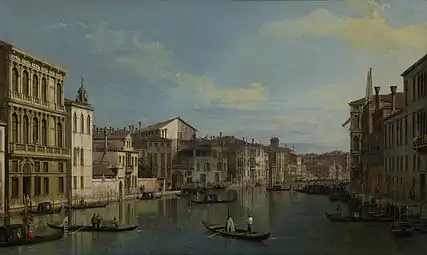The Grand Canal in Venice from Palazzo Flangini to Campo San Marcuola
The Grand Canal in Venice from Palazzo Flangini to Campo San Marcuola is a painting by Canaletto in the J. Paul Getty Museum in Los Angeles, California.[1] Painted around 1738, it may have been commissioned by the English merchant and art collector Joseph Smith (1682–1770).
| The Grand Canal in Venice from Palazzo Flangini to Campo San Marcuola | |
|---|---|
 | |
| Artist | Canaletto (Giovanni Antonio Canal) |
| Year | about 1738 |
| Medium | Oil on canvas |
| Dimensions | 47 cm × 78 cm (18 1⁄2 in × 30 3⁄4 in) |
| Location | J. Paul Getty Museum, Los Angeles, California |
Description
The composition depicts the upper reaches of the Grand Canal near the entrance to the Cannaregio Canal. It is a typical example of the vedute paintings popular with Grand Tour travelers as a visual record of their stay in Venice.
The viewer's vantage point is in the middle of the canal, surrounded by gondolas, barges, and the buildings lining the banks. Many of the structures depicted by Canaletto still stand today, for example Palazzo Flangini, the building at far left, which retains its off-center entrance portal.[2] To the right of the palace, the lantern on the dome of the church of San Geremia is visible, followed by the gabled canonica (rectory) of San Geremia. The trees appearing over a garden wall mark the corner of the Grand Canal and the Cannaregio Canal, which branches off to the left. The garden belongs to Palazzo Labia, the first building on the Cannaregio Canal, adjacent to San Geremia but hidden from view in the painting. The very last building visible in the background of the painting is Palazzo Vendramin Calergi, partly cut off due to the canal's curve to the right.
The painting also records the traghetto, a ferry service using row boats that was the primary means of crossing the Grand Canal prior to the construction of most of the bridges that span it today. One such boat is seen departing from the Riva di Biasio in the foreground at right, while another is prominently shown in the middle of the canal.
Related works
Later versions of this composition are in the Minneapolis Institute of Arts, Grand Canal from Palazzo Flangini to Palazzo Bembo, about 1740,[3] and the Wallace Collection, London, Venice: the Grand Canal from the Palazzo Flangini to San Marcuola, about 1740–50.[4]
Canaletto's nephew Bernardo Bellotto painted an enlarged replica with minor variations around 1740–41.[5] The painting was engraved by Antonio Visentini for the second edition of Venetian views after Canaletto, published in 1742.[6]
Notes
- Getty Museum buys 'Rembrandt Laughing': tiny portrait, huge value, Jori Finkel, the Los Angeles Times, May 9, 2013
- "Palazzo Flangini, Venice", photograph by Gunther H.G. Geick, 2010, retrieved May 10, 2013
- "Grand Canal from Palazzo Flangini to Palazzo Bembo"
- "Venice: the Grand Canal from the Palazzo Flangini to San Marcuola"
- Bernardo Bellotto and the Capitals of Europe, ed. Edgar Peters Bowron, exh. cat., Houston: Museum of Fine Arts, 2001, p. 9, fig. 11.
- Urbis Venetiarum prospectus celebriores, Venice: Pasquali, 1742, part 2, plate 3.
Further reading
- Fahy, Everett, and Francis Watson: The Wrightsman Collection, vol. V: Paintings, Drawings, Sculpture, New York: New York Graphic Society, 1973, pp. 48–52, no. 6.
- Constable, William George, and J. G. Links: Canaletto: Giovanni Antonio Canal 1697–1768, Oxford: Clarendon, 1989, vol. II, pp. 316–17, no. 257(d).
- Canaletto e Bellotto: L’arte della veduta, ed. Bozena Anna Kowalczyk, exh. cat., Turin: Palazzo Bricherasio, 2008, pp. 94–97, no. 22.
- Baetjer, Katharine; Links, J.G., eds. (1989). Canaletto. New York: The Metropolitan Museum of Art. (refer to index for similar works)
External links
- Video on Canaletto's Grand Canal as depicted in the 18th century and today from the J. Paul Getty Museum
- Venice: The Grand Canal from the Palazzo Flangini to San Marcuola at the Wallace Collection, London
- Grand Canal from Palazzo Flangini to Palazzo Bembo at the Minneapolis Institute of Arts
- The Grand Canal in Venice from Palazzo Flangini to Campo San Marcuola at the J. Paul Getty Museum, Los Angeles
- Grand Canal from Palazzo Flangini to Palazzo Bembo at Artsconnected
- Audio commentary from the Minneapolis Institute of Arts at Artsconnected